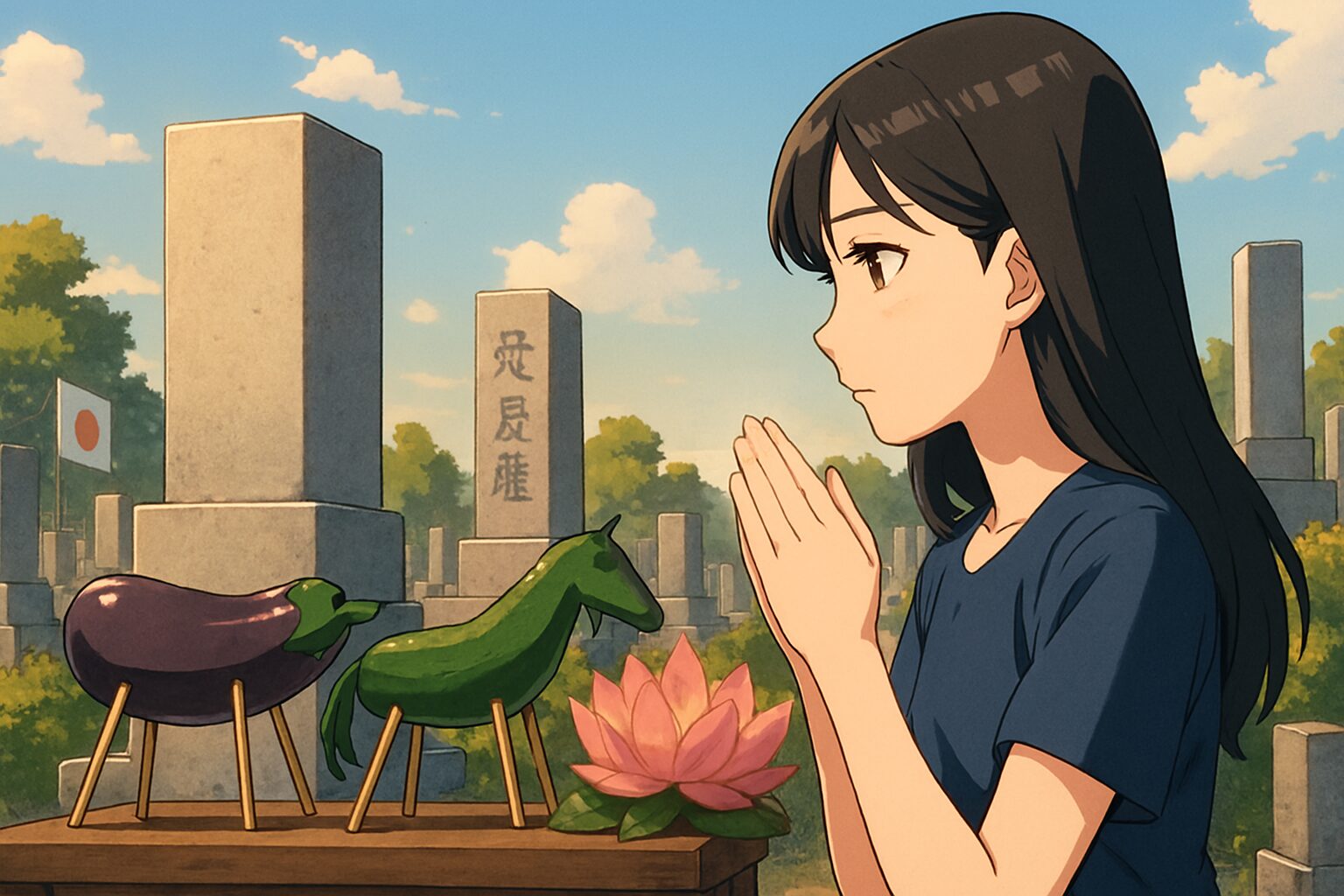— A time to welcome life, embrace memory, and wish for peace —
- Introduction: Why Is August 15 So Special?
- End of War Day: Remembering the Past, Praying for Peace
- What Is Obon? Welcoming the Spirits of Our Ancestors
- A Spiritual Convergence, Not Just Coincidence
- For International Readers: What This Day Means to the Japanese
- Spirit Horses on End of War Day: A Gesture of Welcome
- Conclusion: August 15 as a Crossroads of Life and Memory
- 🌏 A Prayer for Global Peace
- はじめに:なぜ8月15日は特別なのか?
- 終戦の日:戦争の記憶と平和への祈り
- お盆とは:先祖の霊を迎える日本の心
- 精霊馬:命を迎え、送り出す乗り物
- 偶然の一致ではない、精神的な重なり
- 海外の読者へ:日本人がこの日に込める思い
- 終戦の日に精霊馬を飾る意味
- まとめ:8月15日は「命と記憶の交差点」
- 🌏 世界の平和を祈って
Introduction: Why Is August 15 So Special?
Every year on August 15, two profound moments of remembrance converge in Japan. One is “End of War Day”, marking the announcement of Japan’s surrender in World War II in 1945. The other is Obon, a Buddhist tradition where ancestral spirits are welcomed back to the world of the living.
Though this overlap may seem coincidental, it carries a deeply symbolic meaning that reflects the spiritual and emotional heart of Japanese culture.
End of War Day: Remembering the Past, Praying for Peace
On August 15, 1945, Japan accepted the Potsdam Declaration, ending World War II. This day marked a turning point—from an era of war to a future of peace.
- The Japanese government designates this day as one to “mourn the war dead and pray for peace.”
- Memorial ceremonies are held nationwide to honor those who lost their lives.
- More than a historical milestone, it is a day to reflect on the preciousness of life and the weight of peace.
What Is Obon? Welcoming the Spirits of Our Ancestors
Obon is a Buddhist tradition derived from the Ullambana Sutra, in which the disciple Maudgalyayana (Mokuren) seeks to save his mother from suffering in the afterlife. Introduced to Japan in the 7th century, Obon began as a court ritual and gradually spread to aristocrats and commoners alike, becoming a deeply rooted annual event.
Today, Obon is observed from August 13 to 16 in most regions of Japan.
- Families gather to visit graves and offer prayers at home altars.
- A unique custom involves spirit horses made from vegetables:
- Cucumber horse: to bring ancestors swiftly back to the world.
- Eggplant cow: to gently carry them back to the afterlife.
For a deeper look at this tradition, visit: 👉 What is Obon? The Spirit Horses That Carry Our Ancestors Home
These spirit horses are not mere decorations—they are vehicles of emotion, crafted from everyday materials to express love, longing, and reverence.
A Spiritual Convergence, Not Just Coincidence
The overlap of End of War Day and Obon allows Japanese people to reflect on both public and private memory, national history and family legacy, death and life.
| End of War Day | Obon |
|---|---|
| Mourning war victims | Welcoming ancestral spirits |
| Prayers for peace | Feeling the continuity of life |
| National remembrance | Personal remembrance |
| Public ceremonies | Private rituals |
Together, these observances create a sacred intersection of memory and meaning.
For International Readers: What This Day Means to the Japanese
In Japanese culture, death is not seen as an end, but as part of a larger cycle of life. Obon is a time when the spirits of the deceased return to spend time with their families. End of War Day is a time to honor those who died in war and to vow never to repeat the same mistakes.
The convergence of these two days invites reflection on the value of life, the weight of memory, and the hope for peace.
Spirit Horses on End of War Day: A Gesture of Welcome
On August 15, decorating spirit horses becomes a way to welcome not only ancestors, but also those who died in war. It is a gesture of remembrance, gratitude, and continuity—a way to acknowledge that today’s peace is built on their sacrifice.
Conclusion: August 15 as a Crossroads of Life and Memory
On this day, Japanese people pray quietly. They say “Welcome home” to their ancestors, “Thank you” to the war dead, And “Let’s protect peace” to future generations.
🌏 A Prayer for Global Peace
August 15 is not just a Japanese memorial day. It is a day when people around the world can remember the value of life and wish for peace.
May this prayer cross borders. May this quiet hope nurture a future without conflict.
We remember. We welcome. We hope. May peace blossom in every corner of the world.
8月15日、日本が祈る日:終戦の日とお盆が重なる意味とは
— 命を迎え、記憶を抱き、平和を願う時間 —
はじめに:なぜ8月15日は特別なのか?
毎年8月15日、日本では二つの大きな祈りが重なります。 一つは「終戦の日」。1945年、昭和天皇の玉音放送によって戦争の終結が国民に告げられた日です。 もう一つは「お盆」。先祖の霊を迎え、供養する仏教由来の行事です。
この二つが同じ日に重なることは、偶然でありながら、日本人の精神性を象徴するような深い意味を持っています。
終戦の日:戦争の記憶と平和への祈り
1945年8月15日、日本はポツダム宣言を受諾し、第二次世界大戦が終結しました。 この日を境に、日本は「戦争の時代」から「平和の時代」へと歩みを進めます。
- 政府はこの日を「戦没者を追悼し平和を祈念する日」と定めています。
- 全国各地で追悼式典が行われ、戦争で命を落とした人々への祈りが捧げられます。
- しかし、単なる歴史的記念日ではなく、命の尊さと平和の重みを再確認する日でもあります。
お盆とは:先祖の霊を迎える日本の心
お盆は、仏教の「盂蘭盆会(うらぼんえ)」に由来する行事で、先祖の霊がこの世に帰ってくる期間とされています。 多くの地域では8月13日〜16日が一般的で、ちょうど終戦の日と重なります。
🕰️ お盆の起源と歴史
- お盆の起源は、中国の仏教経典『盂蘭盆経』に記された物語にあります。
- その物語では、釈迦の弟子・目連(もくれん)が亡き母を地獄から救うために供養を行ったことが始まりとされています。
- 日本には飛鳥時代(7世紀頃)に仏教とともに伝わり、宮中行事として始まりました。
- 平安時代には貴族の間で広まり、やがて庶民の間にも浸透し、先祖供養の年中行事として定着しました。
つまり、お盆は1300年以上の歴史を持つ、日本人の死生観と家族観が凝縮された行事なのです。
精霊馬:命を迎え、送り出す乗り物
お盆の時期には、精霊馬(しょうりょううま)と呼ばれる野菜で作った動物を飾る風習があります。
- きゅうりの馬(迎え馬):先祖が早く帰ってこられるように。
- なすの牛(送り牛):ゆっくりと帰ってもらうために。
この精霊馬については、こちらの記事で詳しく紹介しています: 👉 What is Obon? The Spirit Horses That Carry Our Ancestors Home
精霊馬は、単なる風習ではなく、命を迎え、送り出すための「乗り物」であり、 人間の感情や祈りを形にした、日本的な美意識の結晶です。
偶然の一致ではない、精神的な重なり
終戦の日とお盆が重なることで、日本人は「公」と「私」、「歴史」と「家族」、「死」と「命」を同時に見つめることになります。
| 終戦の日 | お盆 |
|---|---|
| 戦争の犠牲を悼む | 先祖の霊を迎える |
| 平和への祈り | 命のつながりを感じる |
| 国家の記憶 | 家族の記憶 |
| 公的な追悼 | 私的な供養 |
このように、命の尊さと記憶の継承が一体となる日なのです。
海外の読者へ:日本人がこの日に込める思い
日本の文化では、「死」は終わりではなく、命の循環の一部と考えられています。 お盆は、亡くなった人々が一時的にこの世に戻り、家族と過ごす時間。 終戦の日は、戦争で失われた命に祈りを捧げ、二度と同じ過ちを繰り返さないと誓う日。
この二つが重なることで、日本人は命の尊さ、記憶の重み、そして平和の価値を深く感じるのです。
終戦の日に精霊馬を飾る意味
終戦の日に精霊馬を飾ることは、戦争で亡くなった人々を「先祖」として迎える行為でもあります。 それは、彼らの命を忘れず、今の平和が彼らの犠牲の上にあることを認識すること。 そして、命のつながりを未来へと継承することなのです。
まとめ:8月15日は「命と記憶の交差点」
この日、日本人は静かに祈ります。 先祖の霊に「おかえりなさい」と声をかけ、 戦没者に「ありがとう」と感謝を捧げ、 そして未来の子どもたちに「平和を守ろう」と誓います。
🌏 世界の平和を祈って
8月15日は、日本だけの記念日ではありません。 それは、世界中の人々が命の尊さを思い出し、平和を願う日でもあります。
どうかこの祈りが、国境を越えて届きますように。 どうかこの静かな願いが、争いのない未来を育みますように。
We remember. We welcome. We hope. May peace blossom in every corner of the world.



コメント